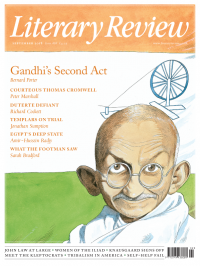John Self
Say Nothing
Milkman
By Anna Burns
Faber & Faber 348pp £14.99
What is the best way to begin a book? Anna Burns, in her third novel, has gone for the now-read-on approach: ‘The day Somebody McSomebody put a gun to my breast and called me a cat and threatened to shoot me was the same day the milkman died.’ But if this sounds like an eye-catching opener up there with Iain Banks’s ‘It was the day my grandmother exploded’, think again. Burns is not a crowd-pleaser; she’s more of the Van Morrison school, playing with her back to the audience. The narrative style in Milkman is screened and distorted through the mind of an eighteen-year-old girl in an unnamed city that’s almost certainly Belfast at the height of the Troubles (an elastic term, but the book is set in the early 1970s). It’s not so much a stream as an eddy of consciousness. Many sentences take several readings to approach comprehensibility: ‘By this he was discomfited but had faith that once she came to with the help of his improvised despotism, she would remember who she was and indignantly reclaim her something beyond the physical once again.’
The unnamed narrator reads a lot, arousing suspicion in her community by burying her head in 19th-century novels while walking the streets. Her voice, however, is less Zola than Yoda (‘Shifted too, my fears did’). But there is design in the awkward style, reflecting the confusion and dislocation of our narrator, damaged by the unwanted attentions of a local paramilitary leader, the titular milkman, who is not a real milkman but a ‘befouler of young girls’. This throws her relationship with her ‘maybe-boyfriend’ (nobody in the novel is named) into chaos: ‘But now, since the milkman, any part of maybe-boyfriend coming towards me brought up in me mounting bouts of revulsion and a feeling that I might at any moment be sick.’
More widely, Burns draws parallels between political violence in the male-dominated community and sexual violence, not just physical but also the ‘mental wreckage’ caused by insinuation and intimidation. Here the wives of paramilitaries are gangsters’ molls, ‘blocking from consciousness … all the dark deeds committed by their lovers’, and power structures make victims unwilling to speak up. The narrator keeps silent about her experiences: ‘That way, I said, I’d hoped to maintain a border to keep my mind separate. That way, I said, I’d hoped to ground and protect myself.’ The danger, of course, is that ‘what you don’t offer – especially in volatile times – people will make up for themselves’. This evasiveness also explains the lack of names for places or people, though the reader might think at times that Seamus Heaney put all this more succinctly in five words when he wrote ‘whatever you say, say nothing’.
There is not much unified plot in Milkman, which is mostly a character study and a series of riffs both comic and tragic, such as an account of a prolonged attempt to dispose of a severed cat head or of the frustration of a schoolteacher trying to get working-class children to see beyond their immediate surroundings. The last section of the book returns to that dramatic opening and unpacks it, to satisfyingly tragic effect. But Burns’s real achievement is the sense she creates of Northern Ireland as an otherworldly place, a threatening fairy-tale setting where people define themselves in opposition to those ‘over the border’, ‘over the water’ or simply ‘over the road’, and where there is ‘the right butter. The wrong butter. The tea of allegiance. The tea of betrayal.’ It’s a world where gatekeepers maintain a list of names that people must not call their children and where ballroom-dancing parents bridge the divide between communities. It’s achieved through one girl’s voice, which finally becomes immersive after close to 350 pages, even if – like many high summits – it’s a long slog to get there.

Sign Up to our newsletter
Receive free articles, highlights from the archive, news, details of prizes, and much more.@Lit_Review
Follow Literary Review on Twitter
Twitter Feed
In 1524, hundreds of thousands of peasants across Germany took up arms against their social superiors.
Peter Marshall investigates the causes and consequences of the German Peasants’ War, the largest uprising in Europe before the French Revolution.
Peter Marshall - Down with the Ox Tax!
Peter Marshall: Down with the Ox Tax! - Summer of Fire and Blood: The German Peasants’ War by Lyndal Roper
literaryreview.co.uk
The Soviet double agent Oleg Gordievsky, who died yesterday, reviewed many books on Russia & spying for our pages. As he lived under threat of assassination, books had to be sent to him under ever-changing pseudonyms. Here are a selection of his pieces:
Literary Review - For People Who Devour Books
Book reviews by Oleg Gordievsky
literaryreview.co.uk
The Soviet Union might seem the last place that the art duo Gilbert & George would achieve success. Yet as the communist regime collapsed, that’s precisely what happened.
@StephenSmithWDS wonders how two East End gadflies infiltrated the Eastern Bloc.
Stephen Smith - From Russia with Lucre
Stephen Smith: From Russia with Lucre - Gilbert & George and the Communists by James Birch
literaryreview.co.uk